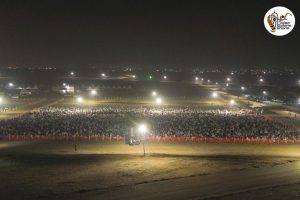
Zanubia Iffat, Germany
Every year, women play an essential role in both the planning and execution of the Jalsa Salana (Annual Convention). They organize and take the lead in their own space at the Convention, similar to that of the men, from where His Holiness, Hazrat Mirza Masroor Ahmad (aba), delivers an address on the Saturday of the Jalsa.
Although many believe that segregation goes against the fundamental rights of women and the practice is perceived as a form of repression, the Ahmadiyya Convention proves that this is far from the truth: year after year, both Ahmadi and non-Ahmadi guests witness the true virtue of segregation and both have no choice but to accept that the practice only empowers women and allows them to make their own decisions to manage more than 60 departments with the help of thousands of female volunteers.
Following the 2018 UK Annual Convention, in reference to the women’s section in the Jalsa, a female journalist stated:
‘I had the opportunity to attend last year’s Annual Convention, however, I was not able to visit the women’s section. But this year I was able to visit it. I must admit that your women are more knowledgeable and active than the men. I saw that they had total freedom and seemed very sincere with the Community. This experience has completely changed my perspective.’
Similarly, Sonia Delesalle, a reporter for the French newspaper Libération stated the following after attending the 2017 UK Annual Convention:
‘When I came I was quite concerned that men and women had been segregated. However, when I visited the venue, I noticed that, in the women’s area, it was men who prepared the food for them. Later, I spent some time in the women’s section and realized that, because of their separate preparations, they had more freedom and, above all, they were completely independent and did everything according to their decisions.’
The organization of the Ahmadiyya Convention is a practical demonstration of how we can extrapolate this Islamic teaching that empowers women in the most essential sense of the word to our daily lives.
About the Author: Zanubia Iffat is a collaborator with The Review of Religions Spanish edition




Add Comment